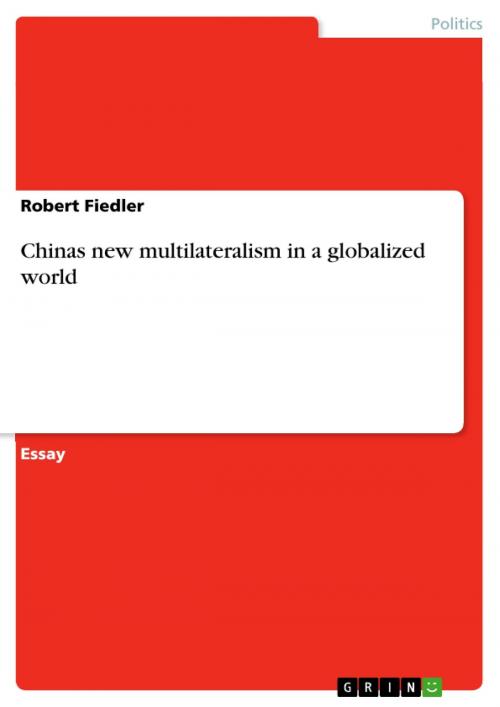Chinas new multilateralism in a globalized world
Nonfiction, Social & Cultural Studies, Political Science, Government, Public Affairs & Administration| Author: | Robert Fiedler | ISBN: | 9783640784226 |
| Publisher: | GRIN Publishing | Publication: | December 23, 2010 |
| Imprint: | GRIN Publishing | Language: | English |
| Author: | Robert Fiedler |
| ISBN: | 9783640784226 |
| Publisher: | GRIN Publishing |
| Publication: | December 23, 2010 |
| Imprint: | GRIN Publishing |
| Language: | English |
Essay from the year 2008 in the subject Politics - International Politics - Region: Other States, grade: 1,8, Macquarie University, language: English, abstract: During the last two decades China gained rising influence in the international environment. Since this rise is observed by many countries with concerns, Chinese politicians are eager to promote a 'less confrontational, more sophisticated, more confident, and at times, more constructive approach towards regional and global affairs' (Medeiros & Fravel, 2003). In other words, China faces the difficulty to become a powerful player in the international system on the one side and to calm the concerns of other nations at the same time on the other side. Therefore, Chinese politicians recognized the importance of multilateral cooperative mechanisms and the shortcoming of bilateral or unilateral approaches to deal with international issues (Wang, 2000, p. 479). Therefore it is not surprisingly that Beijing increased its efforts to participate in international multilateral institutions in order to create win-win situations (Mingquan, 2005). However, in contrast to many western approaches to multilateralism, China emphasizes the principle of sovereignty and non-interference in domestic issues by demanding the acceptance of different political, military and economic domestic systems (Wang, 2000, p. 479). This evolution of foreign policy also accompanies the growing of power and influence and therefore advanced capabilities to safeguard national interests in international relations. Since the security challenges in a post Cold-War era have broadened, the upcoming 'great power' China (Kim, 2003, p. 37) extended its engagement in international institutions and multilateral agreements. Hence, in the following this paper will argue that China's new multilateralism is subordinated to Beijing's security interests in a changing globalized world. In order to support this thesis, central multilateral engagements will be analyzed and it will be argued that China's new approach to international relations utilizes multilateral arrangements to pursue a cooperative security concept which aims at stabilizing of the regional and international environment as well as the combat against new security threats. On the other hand, it will be argued that Beijing's engagement in multilateral bodies aims at the provision of economic security and therefore is significant contribution to secure and stabilize the ongoing rise of the fastest growing economy in the world. Furthermore this paper will analyze underlying incentives for Beijing's engagement in these multilateral bodies.
Essay from the year 2008 in the subject Politics - International Politics - Region: Other States, grade: 1,8, Macquarie University, language: English, abstract: During the last two decades China gained rising influence in the international environment. Since this rise is observed by many countries with concerns, Chinese politicians are eager to promote a 'less confrontational, more sophisticated, more confident, and at times, more constructive approach towards regional and global affairs' (Medeiros & Fravel, 2003). In other words, China faces the difficulty to become a powerful player in the international system on the one side and to calm the concerns of other nations at the same time on the other side. Therefore, Chinese politicians recognized the importance of multilateral cooperative mechanisms and the shortcoming of bilateral or unilateral approaches to deal with international issues (Wang, 2000, p. 479). Therefore it is not surprisingly that Beijing increased its efforts to participate in international multilateral institutions in order to create win-win situations (Mingquan, 2005). However, in contrast to many western approaches to multilateralism, China emphasizes the principle of sovereignty and non-interference in domestic issues by demanding the acceptance of different political, military and economic domestic systems (Wang, 2000, p. 479). This evolution of foreign policy also accompanies the growing of power and influence and therefore advanced capabilities to safeguard national interests in international relations. Since the security challenges in a post Cold-War era have broadened, the upcoming 'great power' China (Kim, 2003, p. 37) extended its engagement in international institutions and multilateral agreements. Hence, in the following this paper will argue that China's new multilateralism is subordinated to Beijing's security interests in a changing globalized world. In order to support this thesis, central multilateral engagements will be analyzed and it will be argued that China's new approach to international relations utilizes multilateral arrangements to pursue a cooperative security concept which aims at stabilizing of the regional and international environment as well as the combat against new security threats. On the other hand, it will be argued that Beijing's engagement in multilateral bodies aims at the provision of economic security and therefore is significant contribution to secure and stabilize the ongoing rise of the fastest growing economy in the world. Furthermore this paper will analyze underlying incentives for Beijing's engagement in these multilateral bodies.















